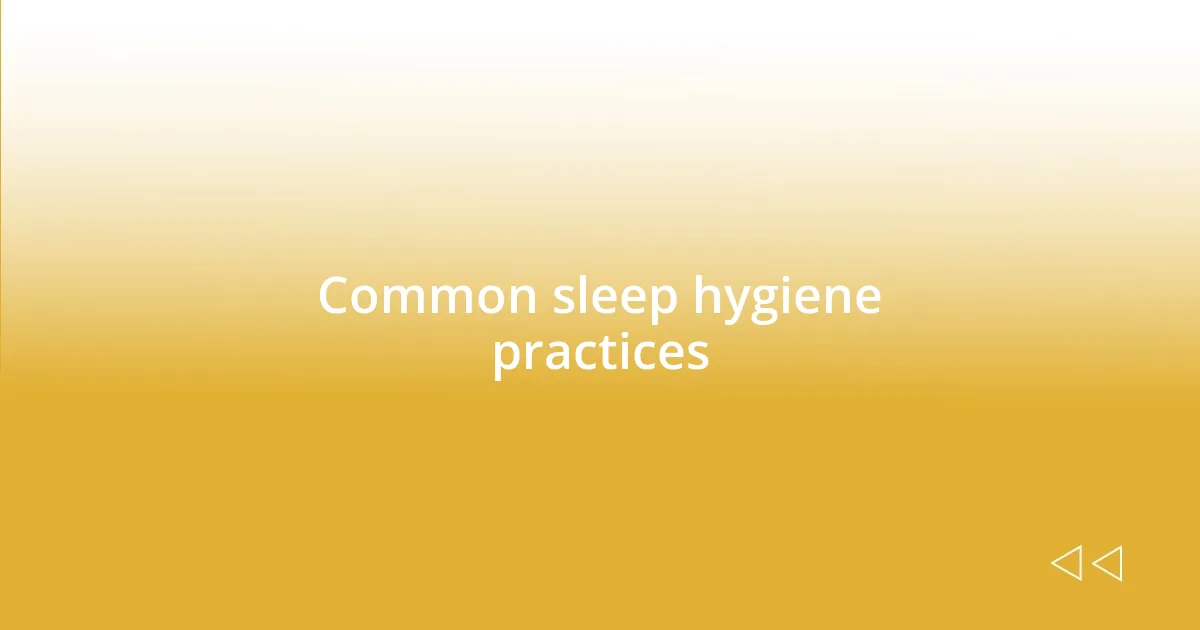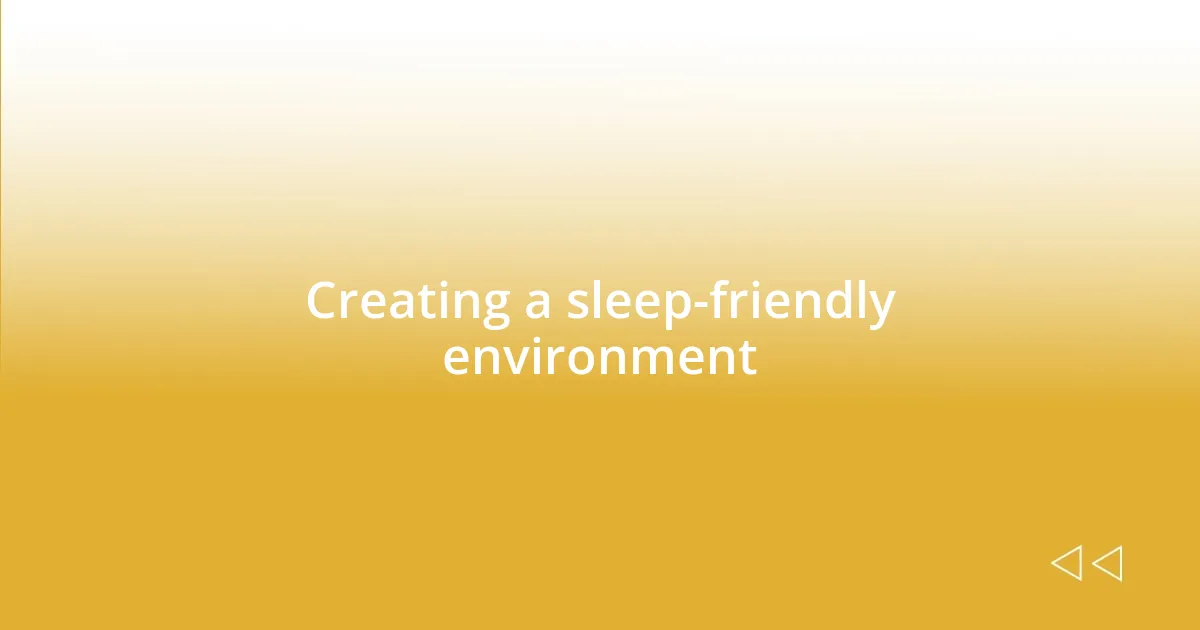Key takeaways:
- Sleep hygiene involves practices that enhance sleep quality, such as maintaining a consistent sleep schedule and creating a calming sleep environment.
- Key benefits of good sleep hygiene include improved mood, increased productivity, better physical health, and enhanced emotional well-being.
- Common practices include limiting caffeine intake, managing screen time before bed, and establishing a relaxing pre-sleep routine.

Understanding sleep hygiene
Sleep hygiene refers to a set of practices and habits that encourage better sleep quality, something I’ve come to appreciate deeply. I remember a time when my sleep was so irregular that I felt chronically tired. It was only through understanding the concept of sleep hygiene that I discovered how much my environment and routines affected my rest.
For instance, I started paying attention to my bedroom—it was cluttered and chaotic, which made it hard to wind down. I realized that creating a calm, dark, and cool space made a world of difference. Have you ever noticed how much more peaceful a tidy room feels at night? Simple adjustments like avoiding screens before bed and establishing a nightly routine transformed my sleep.
I often reflect on how easy it is to overlook the importance of a consistent sleep schedule. When I began going to bed and waking up at the same times each day, I felt more energized and focused. It’s incredible how adopting these small habits can lead to a more restful night. What small changes could you make to your own routine that might revolutionize your sleep?

Importance of sleep hygiene
Sleep hygiene plays a pivotal role in ensuring we’re not just getting enough sleep, but also the quality of sleep we truly need to thrive. I can recall a particularly exhausting period when my late-night snacking and midnight screen time left me waking up feeling groggy and out of sorts. Adjusting my habits was transformative; I found that establishing a calming evening ritual made drifting off to sleep a breeze, and waking up refreshed became my new normal.
Here are some key points highlighting why sleep hygiene matters:
- Enhanced Mood: When I prioritize good sleep habits, I notice a marked improvement in my mood. A well-rested night can make the world feel brighter.
- Increased Productivity: With better sleep quality, my focus and productivity levels rise significantly. I can tackle tasks with clarity and energy, instead of muddling through the day.
- Physical Health Benefits: Consistent sleep hygiene contributes to my overall health, helping to regulate weight and reduce the risk of chronic conditions.
- Improved Mental Wellbeing: As someone who cherishes my mental health, I’ve seen firsthand how consistent sleep patterns can reduce feelings of anxiety and stress.
- Better Relationships: I’ve found that with more rest, I’m more present and patient with others. It creates a ripple effect that enhances my connections.
Each of these points reinforces just how essential sleep hygiene is for overall well-being, both physically and emotionally. It’s not just about the hours we log at night; it’s about the quality of those hours.

Common sleep hygiene practices
Common sleep hygiene practices encompass various habits that can greatly improve our sleep quality. One practice I’ve embraced is creating a pre-sleep routine—something as simple as reading a few pages from my favorite book or enjoying a warm cup of herbal tea. This signals to my body that it’s time to unwind and prepare for sleep, making the transition smoother and more enjoyable.
Another essential practice I’ve discovered is the importance of limiting caffeine intake, especially in the afternoon. I used to find myself relying on coffee to get through the day, but it wasn’t until I reduced my caffeine consumption that I noticed a significant change in my sleep. Suddenly, those restless nights became less frequent and I could finally wake up without that lingering sense of fatigue. It’s fascinating how such a small adjustment can have a profound impact, don’t you think?
Keeping a consistent sleep environment is also crucial for optimizing rest. I learned the hard way that a bedroom full of distractions can lead to a restless mind. By investing in blackout curtains and a white noise machine, I transformed my sleeping space into a sanctuary. Now, I fall asleep faster and wake up feeling more refreshed. This change has truly illuminated how our surroundings can affect our ability to rest deeply.
| Sleep Hygiene Practice | Description |
|---|---|
| Consistent Sleep Schedule | Going to bed and waking up at the same time daily. |
| Pre-Sleep Routine | Establishing calming activities before bedtime. |
| Limiting Caffeine | Avoiding caffeine in the afternoon to improve sleep quality. |
| Sleep-Friendly Environment | Creating a dark, quiet, and comfortable bedroom. |
| Screen Time Management | Avoiding screens at least an hour before bed. |

Creating a sleep-friendly environment
Creating the perfect sleep-friendly environment is something I’ve put a lot of thought into over the years. One of the first adjustments I made was decluttering my bedroom. I used to think that a little mess was no big deal, but once I stripped my space down to the essentials, I felt an immediate weight lift off my shoulders. Now, every time I walk into my room, it feels like a peaceful retreat rather than a chaotic storage area. Have you ever noticed how your surroundings influence your state of mind?
I also learned the significance of lighting. My personal experience with dimming the lights an hour before bed has been eye-opening. I used to keep all the bright overhead lights on while getting ready for sleep, and it made me feel alert instead of relaxed. Switching to softer, warmer lighting not only sets a tranquil mood but also prepares my body for the sleep cycle. It’s such a simple yet effective technique, don’t you think?
Temperature plays a critical role too. After many restless nights, I discovered that a cooler room significantly improves my sleep quality. I typically set my thermostat to around 65°F, which has become my sweet spot. It’s fascinating that something so straightforward can drastically enhance my rest. If you haven’t explored this aspect, I encourage you to try adjusting your room’s temperature – it could truly change the game for you!

Limiting screen time before bed
Limiting screen time before bed is a game-changer in my sleep routine. I remember nights filled with scrolling through social media or binge-watching shows, only to realize I was wide awake long past my bedtime. It’s amazing how the blue light from screens can trick my brain into thinking it’s still daytime. Now, I make it a point to switch off all my devices at least an hour before bed. This simple habit has transformed my sleep quality, allowing me to drift off more easily and wake up feeling refreshed.
It’s interesting to reflect on how hard it was for me to detach from my phone. I went through withdrawal, almost feeling like I was missing out on something essential. But let me tell you, once I established that boundary, the sense of peace that followed was worth it. Now, I might indulge in a good old-fashioned book or some light journaling instead, and I find those activities are so much more fulfilling. Have you ever felt that moment of reprieve when you finally disconnect from the hustle of digital life?
I find that the time spent away from screens not only helps me sleep better but contributes to a more mindful approach to life overall. Those last moments of the day, without the constant buzz of notifications, allow me to reflect, relax, and genuinely prepare for a restful night. By limiting screen time, I’m investing in my well-being in such a meaningful way. What’s stopping you from trying this out? You might just find that it’s a small step with a profound impact.

Developing a consistent sleep schedule
Establishing a consistent sleep schedule has been one of the most transformative aspects of my sleep hygiene journey. In the past, I often went to bed at different times, which left me feeling groggy and disoriented each morning. After committing to a regular bedtime and wake-up time, I noticed a profound shift in my overall energy and mood. Consistency is key, don’t you think? When your body learns what to expect, it rewards you with more restful sleep.
I also found that my weekends used to derail my sleep routine. I would sleep in late on Saturdays, thinking I deserved the extra rest, only to struggle with my sleep schedule come Sunday night. Now, I try to stick as closely to my sleep routine on weekends as possible. This practice has made a world of difference, and I no longer dread Monday mornings. How often do we overlook the power of routine in our daily lives?
Creating a wind-down ritual has been essential for me as well. I dedicate the last 30 minutes before bed to calm my mind and signal my body that it’s time to sleep. This could be anything from sipping herbal tea to indulging in light stretches. I find that this transition can dramatically improve the quality of my sleep. Have you thought about what kind of rituals might soothe your mind before bed? Giving this time to myself not only nurtures a sense of peace but also sets me up for success when morning arrives.

Benefits of good sleep hygiene
Good sleep hygiene has a plethora of benefits that I’ve come to appreciate deeply. For instance, after I started making my bedroom a sleep-friendly environment, I noticed I fell asleep faster and stayed asleep longer. It’s fascinating how something as simple as adjusting the thermostat or adding blackout curtains can create a cocoon of comfort that encourages restful sleep. Have you ever thought about the atmosphere in your sleep space? I would argue it’s crucial to prioritize this often-overlooked aspect of sleep hygiene.
Another benefit I’ve experienced is improved focus and productivity during the day. I remember struggling to concentrate in meetings or even while working on personal projects, often blaming it on stress or distractions. But once I committed to good sleep hygiene practices, I was shocked by how much clearer my mind felt. This mental sharpness permitted me to tackle tasks with renewed vigor—what a game-changer! Isn’t it incredible how sleep can be the key to unlocking your potential?
Lastly, good sleep hygiene plays a significant role in my emotional well-being. During those sleep-deprived nights, I found myself more irritable and prone to anxiety. By prioritizing sleep, I’ve developed a greater emotional resilience. Now, I often wake up feeling refreshed and ready to face the day’s challenges with a positive outlook. Have you noticed how much better your mood can be after a good night’s sleep? It’s almost like pressing a reset button for my emotional health, ensuring I engage with life instead of just going through the motions.












